Back to Black Blu-ray Movie
HomeBack to Black Blu-ray Movie 
Blu-ray + Digital CopyUniversal Studios | 2024 | 123 min | Rated R | Jul 23, 2024
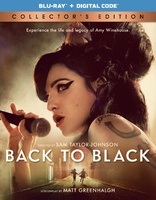
Movie rating
6.1 | / 10 |
Blu-ray rating
| Users | 0.0 | |
| Reviewer | 3.5 | |
| Overall | 3.5 |
Overview
Back to Black (2024)
A celebration of the most iconic – and much missed – homegrown star of the 21st century, this is extraordinary tale of Amy Winehouse. Painting a vivid, vibrant picture of the Camden streets she called home and capturing the struggles of global fame, Back to Black honours Amy’s artistry, wit, and honesty, as well as trying to understand her demons.
Starring: Marisa Abela, Lesley Manville, Jack O'Connell (IV), Eddie Marsan, Juliet CowanDirector: Sam Taylor-Johnson
| Music | Uncertain |
| Biography | Uncertain |
| Drama | Uncertain |
Specifications
Video
Video codec: MPEG-4 AVC
Video resolution: 1080p
Aspect ratio: 1.85:1
Original aspect ratio: 1.85:1
Audio
English: DTS-HD Master Audio 7.1 (48kHz, 24-bit)
French: DTS-HD HR 7.1 (48kHz, 24-bit)
Spanish: DTS-HD HR 7.1
Subtitles
English SDH, French, Spanish
Discs
Blu-ray Disc
Single disc (1 BD)
Digital copy
Packaging
Slipcover in original pressing
Playback
Region A, B (C untested)
Review
Rating summary
| Movie | 3.5 | |
| Video | 4.5 | |
| Audio | 4.5 | |
| Extras | 2.5 | |
| Overall | 3.5 |
Back to Black Blu-ray Movie Review
Reviewed by Justin Dekker July 30, 2024'Back to Black', the biography of Amy Winehouse that focuses on her life from her late teens through the release of the landmark album from
which the film draws its name until her untimely death, arrives on Blu-ray courtesy of Universal. Directed by Sam Taylor-Johnson ("Fifty Shades of
Grey', 'A Million Little
Pieces') and starring Marisa Abela ('Industry') as Amy Winehouse the film features a number of actual locations critical to Winehouse's development
and rise to fame. Special features are light but are highlighted by an informative commentary from Taylor-Johnson, and the technical merits of the
presentation are solid. A DVD is not included, but a slipcover and a Digital Code are.
For quite some time, there was a paparazzi feeding frenzy around Amy Winehouse. Hordes of photographers took thousands of pictures of the
young
music sensation every time she ventured out in public. It didn't seem to matter what she was doing, but there was a percolating underlying hope
amongst them that she would, due to substance abuse and other factors, get up to something sensational. As a result of their nearly around-the-
clock
coverage, much is known and was documented in real time regarding her mercurial relationship with Blake, her out-of-control behavior, and her
performances, with magazines and websites pushing content at a break-neck pace as her career was exploding. Is there much new material, then,
for
a
biopic to provide Amy Winehouse's casual or most dedicated fans?
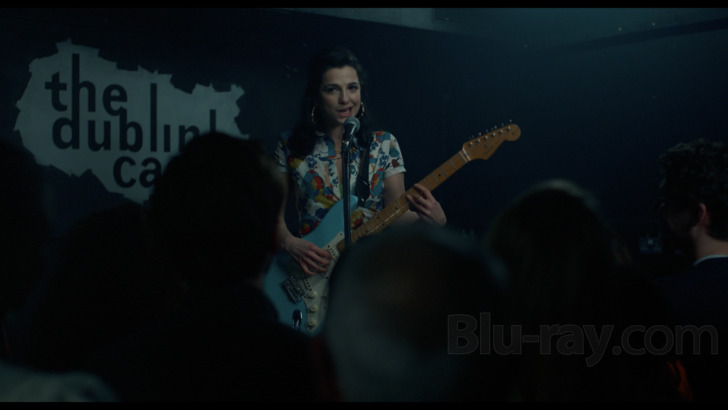
Sam Taylor-Johnson's Back To Black spends a significant portion of the film's run time leading up to the creation of the titular landmark album. In fact, it's not until about an hour into the film's two-hour and three-minute runtime that we get to see a few moments of Marisa Abela's Amy Winehouse in the studio working on the album. Prior to that, we witness Amy spending time with her beloved grandmother, singing during boisterous family gatherings, and taking her first steps as a musician. There is a rawness and authenticity to seeing Abela sitting on her bed, and strumming her acoustic guitar while singing one of her early songs. As Taylor-Johnson states in her commentary track, she wanted the film to feel hopeful, and while it rarely does, it's in these early moments before Amy Winehouse was Amy Winehouse where some modicum of hopefulness is present. Here, we're briefly shown Amy at her healthiest and most confident, resisting industry efforts to mold, shape, and market her by strongly admonishing that she "ain't no (expletive deleted) Spice Girl".
After a difficult meeting with her record label, Abela's Winehouse storms off to the closest pub, where in a chance encounter she meets Blake. It's a meeting that would turn into an obsessive and destructive relationship that, according to the film, would color absolutely everything in her life for the rest of her days. Before meeting Blake, Winehouse was depicted as potentially struggling with alcohol, was using marijuana, and the film hints at bulimia. But after falling head over heels for Blake, Winehouse's situation deteriorates tragically and rapidly. He introduces her to hard narcotics, her alcohol consumption becomes more frequent and copious, and the couple's rocky relationship only serves to exacerbate her issues. The film goes to great lengths to recreate some infamous moments from the couple's life together, whether they be at performances, at home, or on city streets. As troubling as it was to see accounts of these moments as they played out in the media, they are no easier to digest in Back to Black. If viewers believe Blake to be responsible for some or all of the addiction issues that plagued and tormented Winehouse in real life, many will likewise see the incessant, insensitive, and intrusive presence of the paparazzi to be culpable as well, their behavior feeding her insecurities and driving her isolation.
As a biography of the ill-fated musician, one of an uncanny number of performers to die at age 27, Back to Black keeps its focus at the surface of things, never seeking to dig for different perspectives, context, or nuance. Fans seeking new information will be sorely disappointed. So too, will be those who even only occasionally noticed or read to the attention-grabbing headlines and stories of the era that documented her struggles. Sadly, once Winehouse's career begins to take off, the film seems content to simply paint her as an addict in a bad relationship with one issue amplifying the other. It's an unfortunate reduction and minimalization of an important artist who was also a complicated person with some very real issues. Scene after scene features substance abuse and poor decision-making, with very little time dedicated to the music that drove her fame. With the exception of one very brief scene of Abela emotionally recording Back to Black's title track, no meaningful amount of time is given to the creation of that album's music, neither the writing, the studio sessions, or any point in between. One could argue that Amy the musician takes a back seat to Amy the addict and Amy the lovelorn. It's a disappointing moment of art imitating life where once again her music lurks in the shadows of her sensationalized traumas and difficulties.
The single greatest strength that Back to Black has is its star Marisa Abela. While some viewers may surprised to learn, Abela, who was not much of a singer before working on this project, took hours of vocal instruction to not only learn to sing, but to learn to sing like Amy Winehouse. Which isn't to say that what Abela does here is an impression of Amy Winehouse. It isn't. Her preparation allows her to suggest and inhabit Amy Winehouse without devolving into a caricature. It also enables her to realistically perform the previously mentioned song as a teenager in her bedroom, to show the viewer a glimpse of things to come as she sings jazz standards with her family, and later, to deliver the film's most powerful moment in the recording studio. These are high points of the film. However, far too much of Abela's time is spent in drunken antics and lamenting Blake's behavior, endlessly emoting hopelessness and rejection. If even the saddest and most forlorn music can somehow provide a sense of joy, there somehow simply isn't much joy to be found here.
For a film about a musician, music here is often strangely and frustratingly absent. Early in the film, there is false hope that we'll receive some solid performance time as a teenaged Amy sits alone in her room putting together "What is it About Men". After that, while it does provide a few snippets here and there, most of her stage time is focused on audience banter and, in the instance of Glastonbury, her drunken stumbling along the front of the cheering and grasping crowd. It isn't until almost the very end of the film that Taylor-Johnson provides the opportunity to absorb an extended musical performance. Here, we're presented with a recreation of Winehouse's performance of "Rehab" (via satellite from London) for the 50th Grammy Awards in 2008 where she won five times that night including Record of the Year which was presented to her by one of her idols, Tony Bennett. As one final musical treat, viewers should stay through the end credits to enjoy Nick Cave and Warren Ellis' "Song for Amy" which they crafted for this project, and the duo's film score is beautiful.
Back to Black Blu-ray Movie, Video Quality 
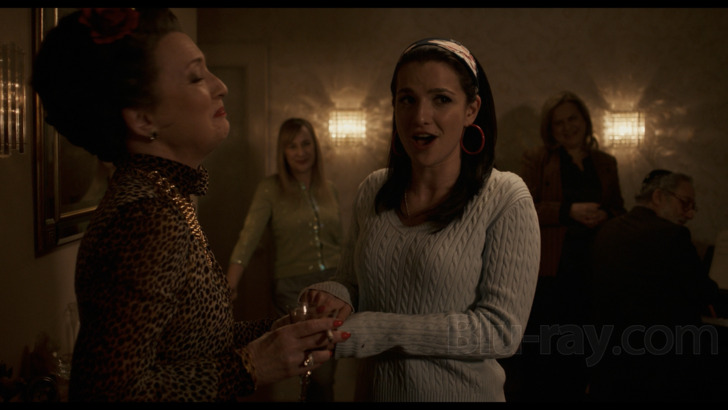
Back to Black looks rather impressive on Blu-ray. Fine detail is consistently strong throughout the film providing viewers with many opportunities to inspect the vintage furnishings that populate the Winehouse home, Amy's childhood room, and her overstuffed flat from early in her career. The exceptional detail levels also reveal particulars on Abela's make-up, numerous tattoos, and the elaborate bouffant hairdo for which Winehouse was famous. Dimensionality and depth are also impressive and are best appreciated in mid- and long-shots in Camden and New York City, but are also solid in interior shots like Ronnie Scott's. Primaries pop nicely even in the frequently gloomy London/Camden locations, and blacks are inky and satisfying. Skin tones are realistic and healthy-looking. I did not detect any defects or anomalies.
Back to Black Blu-ray Movie, Audio Quality 
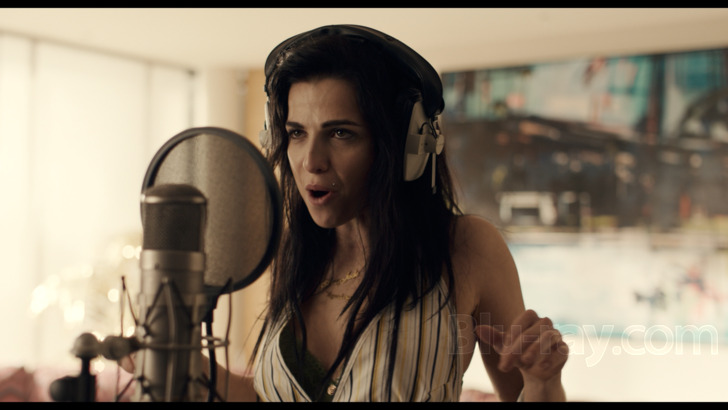
The English DTS-HD Master Audio 7.1 track is very pleasing. It's frequently reservedly immersive but rarely intrusive, distracting, or overpowering. Instead, ambient sounds in the packed clubs and other environments place the viewer comfortably in the middle of the action but allow the focus to remain on Abela and her portrayal of Winehouse. Dialogue is clearly and cleanly reproduced and is typically front and center. Most importantly, however, music is rendered with great fidelity and precision. While I wouldn't describe the bass as powerful, it does provide the needed bottom end to the recreated performances and other musical interludes and tracks in the film, whether they be performances at small clubs, large festivals, or selections from Amy's jukebox.
Back to Black Blu-ray Movie, Special Features and Extras 
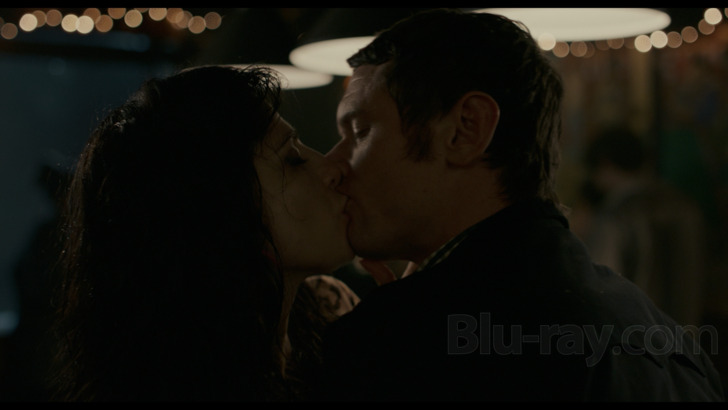
- Transforming Into an Icon (7.47) - Director Sam Taylor-Johnson, Marissa Abela and others discuss Abela's work and preparation for portraying Amy Winehouse.
- Music as the Heartbeat (3.09) - The importance of making the music authentic and rerecording the music with Abela is covered quickly by Director Sam Taylor-Johnson, Marissa Abela and others.
- Feature Commentary - Director Sam Taylor-Johnson discusses her desire to have the film feel hopeful. She goes into the importance of grounding Amy in her family and depicting the significance of her relationship with her grandmother. As the commentary progresses, she gives information about each scene, their ability to use a number of actual locations from Amy's life (like The Dublin Castle, the Winehouse family home, and the iconic Ronnie Scott's), using clothing that belonged to Amy Winehouse, casting decisions, and more. Taylor-Johnson isn't working from an outline here, the commentary is instead free-flowing and in response to the on-screen action. She occasionally falls silent, but only briefly, and her passion and interest in the project are clear.
Back to Black Blu-ray Movie, Overall Score and Recommendation 
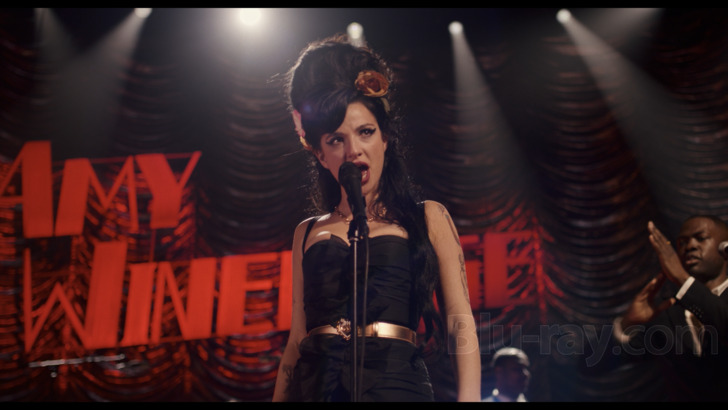
Those who watched Amy Winehouse's story unfold in real time may find it hard to revisit those events here in Sam Taylor-Johnson's Back to Black. While much of what is seen on the screen is accurate, there is little new information or context to provide a deeper and more substantive look into the life of one of the most iconic and unique musical talents of the early 2000s. Similarly, it's a bit of a disappointment that her music doesn't play a bigger role in the film as Queen's music did in Bohemian Rhapsody. Those who only know Amy Winehouse through her music will find the film helpful as it does a solid job placing Amy and her work in a specific place and time, and star Marisa Abela turns in a wonderful performance. Technical merits are strong and the commentary track is enjoyable for those considering a purchase. Recommended.
Similar titles
Similar titles you might also like

Amy
2015

Judy
2019

Love & Mercy
2014

Ray
2004

Whitney Houston: I Wanna Dance with Somebody
2022

Shine 4K
1996

Elvis
2022

I Saw the Light
2015

Miles Ahead
2015

Get on Up
2014

The Buddy Holly Story
Limited Edition to 3000 - SOLD OUT
1978

Whitney
2018

A Star Is Born
2018

La Vie en Rose
La Môme / Warner Archive Collection
2007

Bob Marley: One Love
2024

Bird
1988

Nowhere Boy
2009

Marley
with Bonus Disc
2012

La Bamba
1987

The Soloist
2009